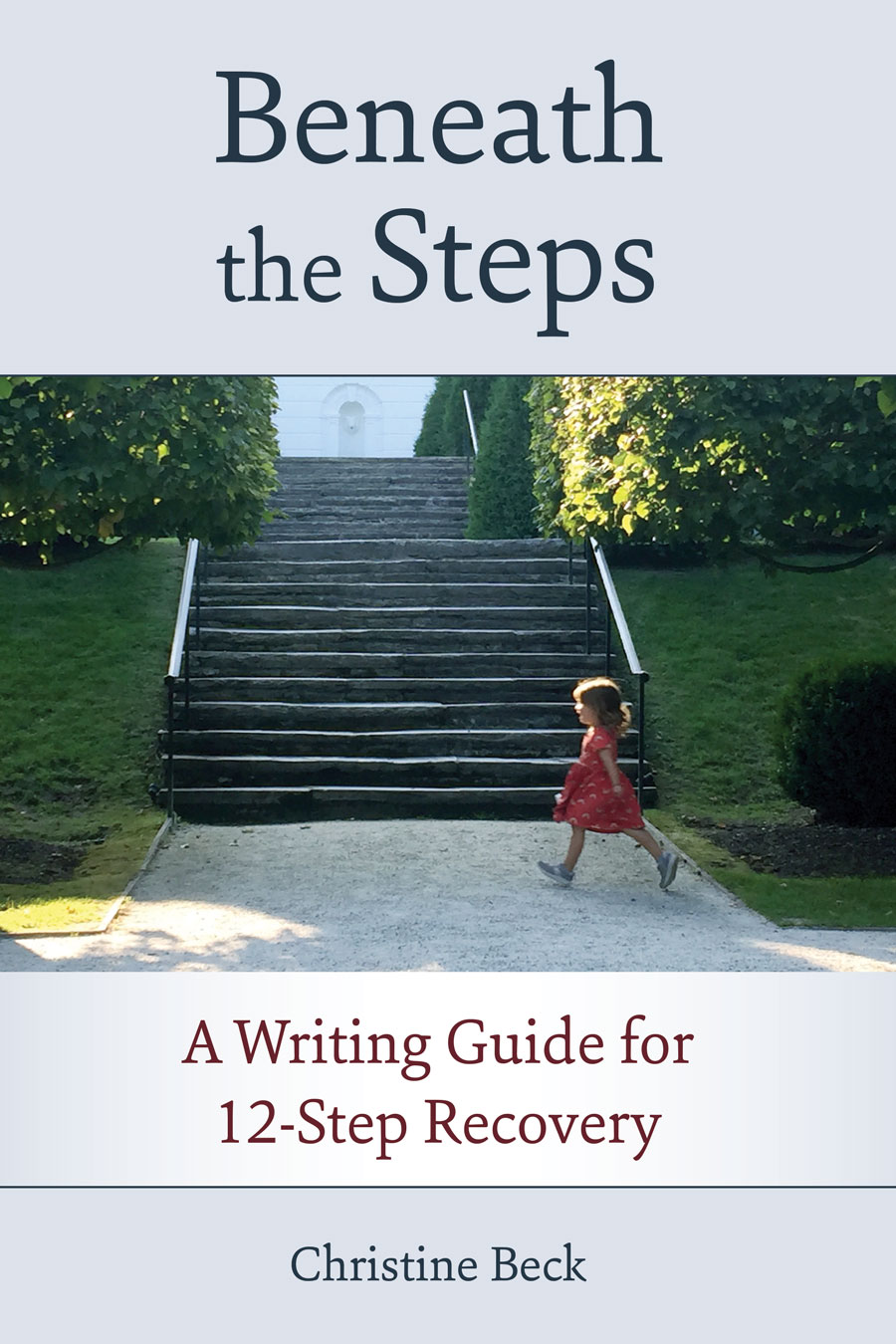
Now available at amazon.com. $14.95. Beneath the Steps is a series of poems and writing prompts that covers my journey in 12-step recovery in Alcoholics Anonymous, Al Anon, and Adult Children of Alcoholics and Dysfunctional Families.
Says John Fox, founder of The Institute for Poetic Medicine: "I admire the courage and fortitude it took for Christine Beck to share her story and her poems. . . in a way that makes her a genuine companion to you in this hard and necessary journey."
This book is the result of three years of leading a group of Recovery Writers in writing about their recovery in response to poems I have written and poetry "prompts" or questions to guide capturing their own stories. I hope you find healing and excitement as you write your own way to recovery!
Below you will find some articles I have written about my recovery. Most of them have been published online at a website called "I Love Recovery Cafe." The first one, How to Stop Drinking," also contains some poetry prompts that appear in my book, "Beneath the Steps."
How to Stop Drinking
No point in telling yourself that Chardonnay tastes like Windex. It doesn’t. It tastes like walking under waterfalls, like sinking backwards into bed with the guy you flirted with at the bar. It smells like a necklace made of daisy chains or the waft of Queen Anne’s lace on a summer Sunday. It always has. It always will. Even the fourth or fifth glass (and that, of course is the problem) tastes just as good as the first.
Don’t try aversion therapy. Even if they showed you livers corroded into cardboard, like those stone-black lungs of tiny Chinese men splayed open in an exhibit called “Bodies Revealed,” you wouldn’t stop. Face it, some smokers don’t get lung cancer. Some drinkers have livers pink as kittens’ tongues. You know that will be you. The one that gets away with it.
You didn’t get caught—no DWI, no blackout at the kids’ concert. You think of Robert Haas’ poem “Dragonflies Mating” where his mother comes to his basketball practice, weaving across the gym, lipstick smeared, reeking, and he admits: “I wanted to kill her.” No one wants to kill you.
Your kid comes home and tells you: “Mom, we learned in school today that anyone who drinks every day is an alcoholic.” “No sweetie,” you say, as you lift your Waterford crystal glass of Montrachet, “it’s not people like us they meant. Of course we’re not alcoholics.”
But you know, don’t you? You know where this is headed because you grew up at the feet of “just how bad it gets.” Lift your gaze from the elixir swirling in your glass and take a look at what comes next.
Prompt:
1. Write a “how to stop” poem about any behavior you would like to change. It could be drinking, eating, shopping, even obsessive thinking.
2. Start writing about all the ways it could have been worse. Then “turn” your poem to just how bad it got, or to a “yet,” where it could go if left untreated.
Yes You Are!
My Adult Children of Alcoholics meetings end with members stating an Affirmation. We began by using the list on page 329 of the Big Red Book. Those affirmations all begin with “It is okay.” Some examples are “It is okay to know another way to live.” “It is okay to say no without feeling guilty,” and “It is okay to say ‘I don’t know.’” Many of these affirmations mirror the statements that different meetings have developed into a Bill of Rights. Examples are “I have a right to say no.” “I have a right to take healthy risks,” or I have the right to expect honesty from others.”
These affirmations are helpful, but they do not go to the heart of claiming who I am as a person in recovery. They do not include statements such as “I am lovable just as I am,” “I am vulnerable in relationships,” or “I am worthy of recovery.” In other words, because of couching the affirmations in language such as “it is okay” or “I have a right,” I sell myself short on claiming my True Self as an affirmation.
At the ACA world convention in Malmo, Sweden, I heard another approach to affirmations that touched me deeply. At the end of a workshop, the leader handed out a sheet with adjectives in three columns. The adjectives were all positive attribute such as “passionate, kind, lovable, considerate.”
We were each asked to say out loud one quality from each column, such as “I am passionate, I am curious. I am kind”(The columns seemed to be just a format to get each person to choose three qualities.) Then the leader looked the speaker in the eye and said “Yes You Are!
Each person in the room had a turn. Each time he or she was affirmed with “Yes You Are” a feeling rippled through the room. The leader had stepped into the shoes of Inner Loving Parent! That’s when I saw that affirmations are a two-way street. I claim my affirmation. But my Inner Loving Parent acknowledges and affirms it.
We have tried using this approach in our meetings. Now, instead of one person saying “Yes You Are,” the entire room says it at once. Try it. It is powerful!
Christine Beck